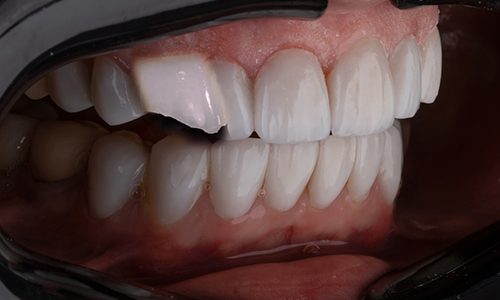Everything You Should Know About Chipped Teeth
Cracked teeth are common; in most cases, dentists can save the natural tooth if the issue is detected and treated promptly. At First Point Dental, one of the Best Chicago Dental Clinic, we specialize in repairing damaged/chipped teeth and providing patients with a comprehensive dental service. Even treating anxious patients is our specialty, so you can rest assured that you’re safe with us.
This includes identifying them, what causes them, how to treat them, the symptoms, why a dental consultation is necessary, and what to expect after your tooth has been repaired.
What Causes a Tooth to Crack?
There are a variety of causes for tooth cracking, and it is essential that you understand these causes to reduce the risk of damaging your teeth. The most frequent causes are:
Teeth fracture for several reasons, including:
- Teeth grinding (bruxism) – Extreme tooth grinding or clenching can exert tremendous force on the teeth.
- Inadequately fitted fillings – Large silver or plastic fillings that weaken the tooth.
- Alterations in mouth temperature- As with the concrete in your driveway, extreme temperature fluctuations can cause cracks. Large tooth-colored or silver fillings frequently expand and contract in response to the daily hot and cold beverages. This constant temperature change can cause these fillings to fracture.
- Consuming solid foods, such as ice, nuts, and hard candies.
- Accidents or injuries can cause a tooth to shatter, break, or become loose.
- Large fillings weaken the tooth’s structure.
- Age – As we get older, our teeth become more prone to damage.
- Trauma to the lower jaw or face.
- Gum disease, if bone loss has occurred. This could increase the likelihood of tooth root fractures.

How do Tooth Cracks Occur?
Teeth can crack in various ways; sometimes, the cracks are visible, and other times they can only be identified through specialized tests.
A cracked tooth occurs when a fracture extends from the chewing surface of the tooth to the root. Occasionally, it penetrates below the gum line and into the root. Typically, a cracked tooth is not separated into two pieces, but its inner, soft tissue is damaged. In most instances, cracked teeth will require extraction.
- Craze lines: These are minute fissures that only affect the tooth’s outer enamel. They are present in all adult teeth and are painless. These lines typically do not require treatment.
- Cracked cusp: The cusp is the pointed portion of the tooth’s biting surface. The tooth is extremely susceptible to further deterioration if a cusp is damaged. When biting, you will typically experience a sharp pain in this tooth. Treatment is recommended immediately.
This is frequently the result of an untreated cracked tooth. The tooth fragments into two pieces. Vertical root fractures are cracks that originate in the root and ascend to the tooth’s surface. Fractured teeth must be extracted.
What are the Symptoms of Broken/Chipped Teeth?
Unfortunately, most symptoms of chipped teeth are difficult to identify, especially in the absence of physical trauma. As previously mentioned, teeth can crack for various reasons, and the cracks may not be visible at first glance; for instance, extreme temperature changes within the mouth can cause teeth to crack. Similarly, consuming sugary foods and beverages may cause the affected tooth to become painful and sensitive. Additionally, swollen gums are a common side effect of cracked teeth.
If you have experienced trauma to a tooth and it is evident that it has cracked, try to locate the broken piece so your dentist can possibly bond it back onto the tooth.

Can a Tooth Fracture Heal on its Own?
No, a tooth fracture will not heal on its own. It will require filling with a crown or veneer, and while this method strengthens and protects the tooth from infection, your natural tooth will not recover. Therefore, it is crucial to seek treatment as soon as the crack is noticed.
Is a Tooth Fracture an Emergency?
A cracked tooth is typically considered an emergency. This is because, despite the fact that a cracked tooth may not initially be painful or appear severe, the hole can grow over time if left untreated. When this occurs, an increasing number of bacteria enter the affected area, which can lead to infection and, in extreme cases, tooth loss. A cracked tooth can therefore be considered an emergency.
Cure/Treatment for Cracked Teeth
Early diagnosis is essential for tooth preservation. If the crack has reached the nerve of the tooth, root canal therapy, and a crown can be used to prevent the crack from spreading. However, if the fracture extends below the gum line, the tooth is irreparable and must be extracted.
Therefore, early treatment is crucial. A cracked tooth that is not treated will worsen over time, eventually leading to tooth loss. Early detection and treatment are crucial for saving these teeth. The treatment you receive for your cracked tooth is crucial, as it will alleviate pain and decrease the likelihood of the crack worsening. After treatment, the majority of cracked teeth continue to function and provide years of chewing comfort. Depending on the type of tooth fracture, several treatment options are available.
Bonding
In this procedure, the best dentist in Chicago fills the crack with the best resin, restoring its appearance and function.
Crown
A dental crown is a prosthetic device typically made of porcelain or ceramic. It covers or caps the damaged tooth. To prepare a tooth for a crown, the dentist removes some enamel to make room in the mouth. He then scans the tooth, selects a shade that matches your teeth, and fabricates the crown in-office.
Root Canal Treatment
When a crack is so severe that it reaches the nerve, the First Point Dentist will recommend a root canal to remove the damaged nerve and restore the tooth’s integrity. This procedure can prevent an infection from developing in the tooth.
Extraction
When the tooth’s structure, nerves, and roots are severely damaged, tooth extraction may be the best course of action.
How to Prevent a Chipped Teeth?
Although cracked teeth are not completely preventable, there are steps you can take to reduce their likelihood. Healthy teeth are less likely to crack, so it is necessary to possess good oral hygiene. I brush twice per day, floss every day, and see a local dentist every three to six months for preventive care. Avoid chewing on hard objects like ice and pens. If you do clench or grind your teeth, consult a dentist about obtaining a retainer or night guard to protect them.
Please contact us to schedule an appointment to determine if you have a Cracked Tooth.

